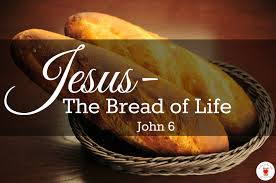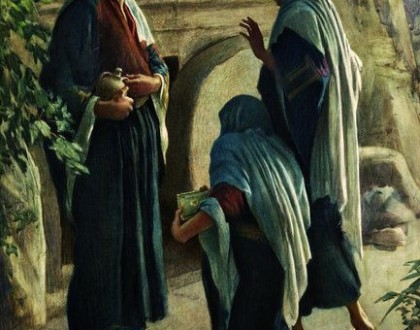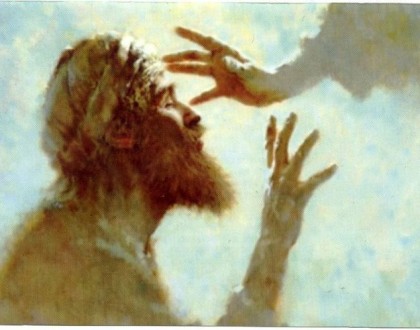21st Sunday in Ordinary Time

21st Sunday in Ordinary Time
In this Sunday’s Gospel [John 6:60-69], we hear of the mixed reactions of Jesus’ disciples to the Bread of Life discourse that we have heard over the past weeks. Jesus provided bread, but his bread is not like the manna that God provided in the wilderness; this bread is himself, his very life; and those who eat it “will live forever.” As is often the case in John’s Gospel, small, ordinary words such as bread and life are loaded with theological meaning. Centuries of Eucharistic theology and reflection give us a way to understand these words, but at the time they were first spoken, they were more than puzzling—they were even offensive to some people. Rightly reading the mood of his audience, Jesus says, “Does this offend you?”
Jesus’ challenge sets up a critical turning point in the Gospel. Not only are we told that one of Jesus’ followers would betray him; we also learn that some of those who had been following Jesus “turned back and no longer went about with him.” The group gets smaller as the stakes get higher. Whatever explanation Jesus gives, some choose to walk away, thus revoking their loyalty. John uses the word “disciples” for those who turn back. These were not casual or seasonal listeners: they were disciples who knew him and were most likely known by him.
Chapter 6 in St John is one of the most incredible scenes in the New Testament. It begins with thousands and thousands following Jesus and ends with everyone leaving him because He has just asked them to “eat his flesh”, a seemingly crazy statement. Just 12 are left and even they are at a loss for words and are probably tempted to leave also.
“Do you also wish to go away?”
Then Jesus called the Twelve together and put the question to them straightforward: “Do you also wish to go away?” Peter plays the role of spokesperson, just as he does in the other Gospels: “Lord, to whom can we go? You have the words of eternal life.” While the words are different, this exchange is much the same as Peter’s confession at Caesarea Philippi. There, Jesus asks, “Who do people say that I am?” – to which Peter responds, “You are the Messiah” (Mark 8:27-30). In both cases, the miracle of the feeding is the backdrop for the crucial question: who is Jesus really?
Christ’s scandalous teaching today
The depth and significance of Christ’s message, and the teaching of the Church, scandalizes, in the sense that it is often a stumbling block for the disbeliever and it is a test for the believer. The theme of scandal, in the New Testament is connected with faith, as free acceptance of the mystery of Christ. Before the Gospel we cannot remain indifferent, lukewarm or evasive: the Lord calls each of us personally asking us to declare ourselves for him (cf Mt 10, 32-33).
When we are faced with the difficult teachings of Jesus and the Church, do we also wish to go away? Is it not true that many times, because of the complexity of the issues, and the pressures of the society around us, we may wish to “go away?”
Peter’s response to the Jesus’ question, “Do you also wish to go away?” in Sunday’s Gospel is striking. He doesn’t say, “yes, of course,” but he doesn’t quite say “no” either. Instead, in good Gospel-style, he answers back with another question: “To whom else can we go?” It is not the most flattering answer in the world, but it is honest. Peter and the others stay with Jesus precisely because he has been a source of life for them. Jesus liberated them and given them a new life.
Following Jesus and the teaching of the Church may not always be easy, or pleasant, or even totally comprehensible, but when it comes to the eternal-life business, there’s not much out there in the way of alternatives.
This week let us not forget the words of Jesus: “Whoever eats me will live because of me.”
Blessed are we if we do not take offense but are led by these words to abundant life.
Recent Sermons

Easter Sunday – The Resurrection
April 14, 2017

4th Sunday of Lent Year A – The Man Born Blind
March 27, 2017

3rd Sunday of Lent Year A – The Samaritan Woman at the Well
March 20, 2017





